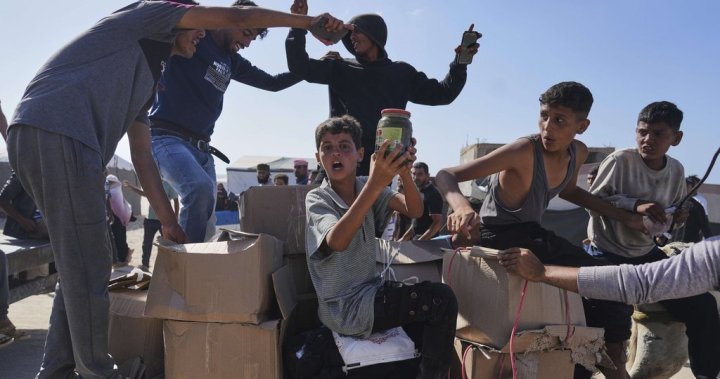Desperate Gazans swarmed food distribution trucks yesterday in the central Gaza Strip, a harrowing scene that underscores the catastrophic humanitarian crisis now entering its eighth month. Standing amid the chaos, I witnessed hundreds of people rushing toward aid vehicles, some collapsing from exhaustion in the scramble for survival.
“We haven’t eaten properly in days,” Mohammed Saleh told me, his hands trembling as he clutched an empty flour sack. “My children are losing weight. We wait for hours, sometimes days, only to be turned away when supplies run out.”
The incident occurred near Deir al-Balah, where aid workers struggled to maintain order as crowds overwhelmed the distribution point. According to the UN Office for the Coordination of Humanitarian Affairs (OCHA), only 15% of required food supplies entered Gaza last month, creating conditions of severe scarcity that fuel these dangerous scenarios.
Israeli military officials maintain that security protocols are necessary during aid deliveries, citing concerns about Hamas diverting supplies. “We are working to facilitate humanitarian aid while ensuring our security requirements,” said IDF spokesperson Lt. Col. Avichay Adraee in a statement released yesterday.
But international aid organizations paint a different picture. Médecins Sans Frontières reported that bureaucratic restrictions and security checkpoints have created a “deliberate stranglehold” on essential supplies. Their field coordinator in Gaza, Elena Martínez, explained during our call that “the system isn’t just broken—it appears designed to fail.”
The World Food Programme warned last week that famine conditions are spreading across northern Gaza, with “catastrophic hunger” now affecting approximately 700,000 people. Their satellite analysis shows agricultural land has been rendered unusable in many areas, compounding long-term food insecurity.
I spoke with Fatima Abo Jarad, a mother of four sheltering in a school-turned-displacement-center in central Gaza. “Before, we worried about what to eat. Now we worry if we will eat at all,” she said, showing me her daily ration—a small bag of rice and lentils meant to feed six people.
The humanitarian crisis extends beyond food. Clean water remains scarce, with Gaza’s water infrastructure operating at less than 20% capacity, according to UNICEF assessments. Medical supplies struggle to reach facilities where they’re desperately needed.
Local initiatives have emerged to fill gaps where international aid fails. Community kitchens operated by volunteers provide one meal daily in some areas. “We pool whatever ingredients we can find,” explained Kareem Nasser, who coordinates a makeshift kitchen serving 500 people daily in Nuseirat camp. “Sometimes it’s just rice and tea, but it keeps people going another day.”
U.S. officials have increased pressure on Israel to facilitate more humanitarian access. Secretary of State Antony Blinken emphasized during his recent regional visit that “there must be a sustained surge of assistance throughout Gaza.” Yet the gap between diplomatic statements and ground realities remains vast.
Yesterday’s distribution chaos injured seventeen people, including four children, according to Palestinian medical sources. Aid workers report this scene repeats itself across Gaza with increasing frequency.
European Union humanitarian chief Janez Lenarčič called the situation “morally indefensible” after satellite imagery revealed aid trucks backed up for kilometers at crossing points. The EU has pledged additional funding while demanding unhindered access for humanitarian organizations.
The mechanics of aid delivery have become increasingly complex. Israel implemented a maritime corridor from Cyprus, but aid workers say volumes remain insufficient compared to land routes. Temporary piers constructed by the U.S. military bring supplies directly to Gaza’s shores, bypassing land checkpoints, though capacity constraints limit effectiveness.
“Each distribution point becomes a flashpoint for desperation,” explained Omar Shakir, Human Rights Watch‘s Israel-Palestine director, who documented similar incidents across multiple locations. “When people are starving, maintaining order becomes impossible.”
The psychological impact on children remains particularly concerning. UNICEF reports increasing cases of malnutrition-related complications in pediatric facilities across Gaza. Dr. Nasser Al-Tatari at Al-Aqsa Hospital told me, “Children arrive not just hungry but traumatized by the constant struggle for food.”
The struggle for basic necessities continues as diplomatic efforts for sustainable solutions stall. For families like Mohammed’s, yesterday’s chaotic scene wasn’t exceptional—it represented their new daily reality in a land where survival itself has become a full-time occupation.






